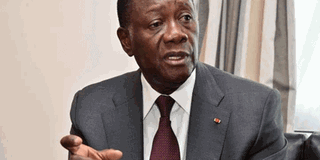Ivory Coast's Ouattara says 'someone must be responsible' for poll deaths

Ivory Coast's president Alassane Ouattara. PHOTO | ISSOUF SANOGO | AFP
What you need to know:
- ICC judges acquitted Gbagbo and his aide Charles Ble Goude on charges over wave of violence after disputed elections in 2010.
- Gbagbo, the first former head of state to stand trial at the ICC, lives in Belgium under conditions pending a possible prosecution appeal.
ICC's unwillingness to let Gbagbo return to Ivory Coast is thought to have been linked to the country's refusal to surrender Gbagbo's first wife, Simone.
ABIDJAN,
Ivory Coast's President Alassane Ouattara has refused to comment on the acquittal on crimes against humanity of his predecessor Laurent Gbagbo at the International Criminal Court while insisting investigations would continue.
"No reaction from me, it's an ongoing trial...," Ouattara said in an interview with Radio France International in the Ethiopian capital Addis Ababa where he was attending an African Union summit.
But he added: "Someone must be responsible for the 3,000 deaths. I hope that justice will shine a light on that, it is what the victims are asking for."
ICC judges acquitted Gbagbo and his aide Charles Ble Goude on charges stemming from a wave of violence after disputed elections in the west African nation in 2010.
More than 3,000 people died on both sides of the Ivory Coast conflict after Gbagbo refused to concede defeat to Ouattara, his internationally backed rival.
GBAGBO'S WIFE
Gbagbo, the first former head of state to stand trial at the ICC, is currently living in Belgium under conditions pending a possible prosecution appeal following the acquittal on January 15.
He had been held in the Netherlands since 2011.
The ICC's unwillingness to let Gbagbo return to Ivory Coast is thought to have been linked to the country's refusal to surrender Gbagbo's first wife, Simone, despite an outstanding ICC warrant for her arrest for her role in the post-election violence.
She was convicted and jailed by the courts there in 2015, but Ouattara granted her an amnesty last year along with 800 others.
"We are continuing our investigations in order to establish who is responsible (for the deaths)," Ouattara said in the interview to be broadcast Monday.
GUILLAUME SORO
He denied that any pressure had been brought to bear on the ICC to prolong the detention or trial of Gbagbo, whose release has come at a particularly tense time in Ivory Coast.
"Interfering with international or national justice, this is not how I manage my country... let justice take its course," he said, refusing to discuss any possible return of Gbagbo. "Let's wait and see."
Ouattara also returned to the subject of the resignation of the speaker of the National Assembly, Guillaume Soro, who headed rebel forces during the Ivorian war, then joined the government under Gbagbo.
Soro is a member of Ouattara's Rally of Republicans (RDR) but is rumoured to have fallen out with him.
Ouattara nonetheless said there was "no problem" between them, adding: "I do not rule out that he will return."
Ouattara also did not rule out Soro standing for the presidency in 2020 — and left open the possibility that he might seek another term even though the coalition he formed with Henri Konan Bedie, his former ally against Gbagbo, has collapsed.
"It's very clear, I can run if I want. There's a new constitution (since 2016)," he said.
"All the legal opinions that I have consulted have confirmed it. I will announce my decision in 2020. I can take a decision up until July 28, 2020," he said.
'TRANSITION'
Visiting US Undersecretary of State for Political Affairs David Hale recalled a statement Ouattara made last year indicating it was time for a transition to a new generation of leaders.
"And I think that's a commendable statement," said Hale.
But the US diplomat added: "It's his choice, he can do as he wishes. The constitution authorises him to do so and it is not a question of me standing in the way of his candidature.
"You know it is not an American decision. It is for the Ivoirian people to make these choices, said Hale.





